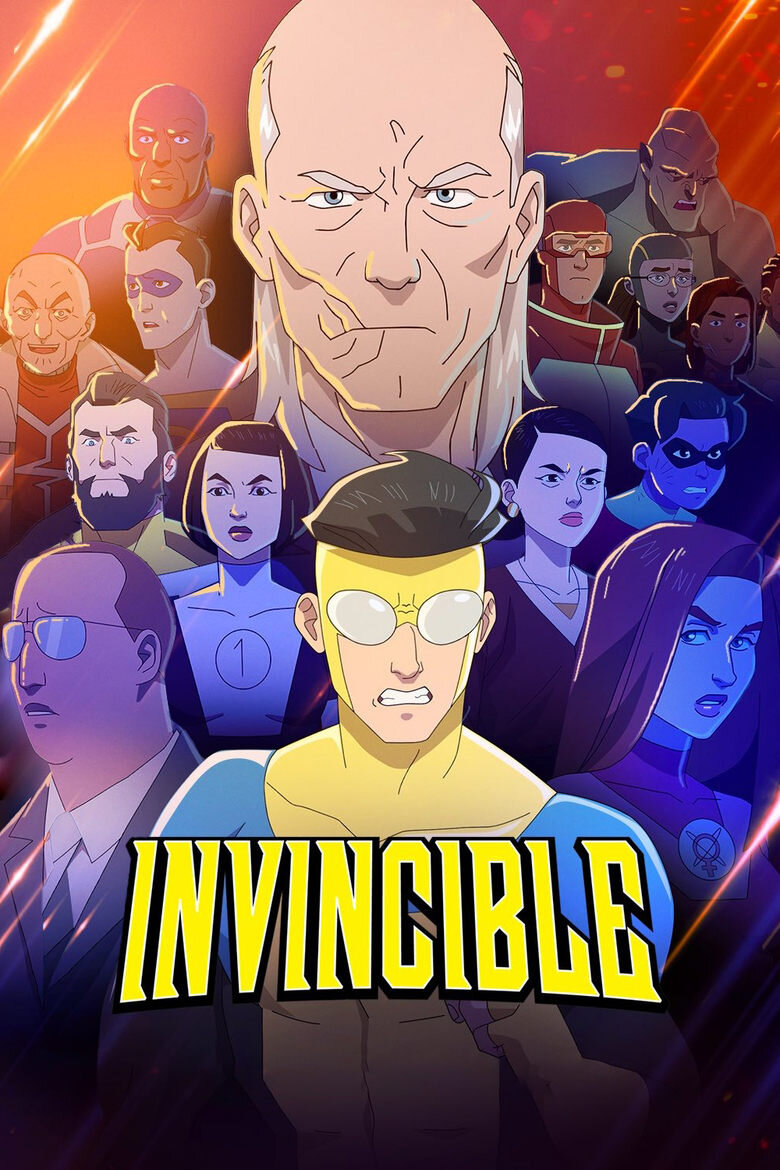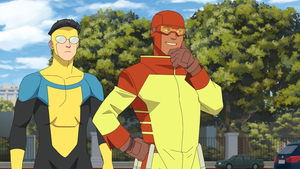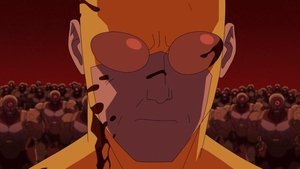INVINCIBLE
A DEAL WITH THE DEVIL
Season: 3
Episode: 2
Air date: 2025-02-06
Guest stars: Cliff Curtis,Khary Payton,Ben Schwartz,Walton Goggins,Gillian Jacobs,Zachary Quinto,Jason Mantzoukas,Luke Macfarlane,Christian Convery,Cleveland Berto,Grey DeLisle,Chris Diamantopoulos,Nyima Funk,Robert Kesselman,Melise,Ross Marquand,Dan Navarro,Jay Pharoah,Ami Shukla,Kari Wahlgren,Bokeem Woodbine
Mark takes a stand, unaware of the ramifications for his family, the GDA, and even the Guardians. Cecil remembers his past and Eve makes an important decision.
“We can be the good guys. Or we can be the guys that saved the world. We can't be both.”
I’d like to think I’ve mellowed over the years—at least enough to accept that being right doesn’t give you carte blanche to bulldoze over someone else’s perspective. That’s supposed to be how democracies work. But what this episode explores—masterfully, I might add—is what happens when the stakes get so high that compromise starts looking like cowardice, and authoritarian “solutions” start sounding… practical.
And yeah, I
am dragging my beloved “Full Metal Daemon Muramasa” into this again. Because once more, it’s relevant. That story’s relentless dissection of moral absolutism and justified violence fits perfectly alongside this episode’s focus on what it really means to kill “for the righteous cause.” There's a moment—chilling in its casualness—where a character openly wonders why someone isn’t just killed to eliminate the problem. It’s a disturbingly childlike logic, and
exactly the kind of thinking that slides us from civilization into the abyss.
I do believe that rehabilitation for criminals is essential, even if I have my threshold for how much that concept is entertained, a line in the sand. This episode shows why some of the Guardians of the Globe (still a hilariously derivative name) might sympathize with Cecil’s methods—not because they condone them, but because they, too, are trying to make peace with past mistakes. As I noted in my review of the season premiere, when you're staring down the barrel of Viltrumite power,
niceties are a luxury. Even Iron Man had a Hulkbuster.
What really elevates the episode, though, is its look backward. We finally get a flashback peeling back the layers on Cecil—
the Nick Fury of the nihilistic multiverse. We see a younger, more idealistic version of him who isn’t that far off from where Mark is now, and watching him evolve—or erode—into the cold tactician of today is both fascinating and gut-wrenching. It's the kind of character study that shows you how a rational person might be pushed to consider more pragmatic solutions in the face of such unstoppable threats that no mortal man could handle.
That said, Cecil in the present-day definitely crosses into full
Civil War Tony Stark territory—Mark Millar, not the Russos—less "visionary futurist" and more "man with a God complex and a syringe full of control issues." Without spoiling anything, let’s just say certain decisions he makes concerning Mark involve a total disregard for things like consent and bodily autonomy. And sure, I get it—Mark
could turn him into paste before finishing a sentence, and yes, he’s been veering into punch-first, ask-later territory lately. But Cecil’s preventative measures aren’t safety nets—they’re
landmines with a smug warning label that says “for your own good.” That's how fascist regime starts: benevolent dictatorships.
What’s smart is that the episode doesn’t pretend it’s a simple matter of right and wrong. You may
understand Cecil. You might even
agree with him in theory. But that doesn’t mean you trust him. And when heroes are treated less like people and more like unpredictable weapons that need failsafes, can you blame them for jumping ship? That mistrust isn’t just emotional—it’s
justified. Such opposition keeps moral boundaries in check, because as the old saying goes,
"Who watches the Watchmen?"
Thankfully, amidst all this moral chaos, we get a few much-needed breathers—namely Mark and Eve. Their dynamic offers a grounded counterweight to the philosophical brawling, and for once, Mark handles things like a grown-up. It's a small win, but it signals maturity in his thinking—something he desperately needs right now.
Overall, this episode is a massive step up from the season opener. It dives into tough, uncomfortable questions without hand-holding or cheap moralizing. Granted,
some of the dialogue leans into sermon-mode and could stand to trust the audience a little more—but those moments are rare enough not to sink the ship.
This is
Invincible doing what it does best: punching through faces and ideologies alike. Bloody, smart, uncomfortable, and unrelenting—it’s the show reminding us that being a hero is hard, being right is harder, and surviving your own ideals? Damn near impossible.










